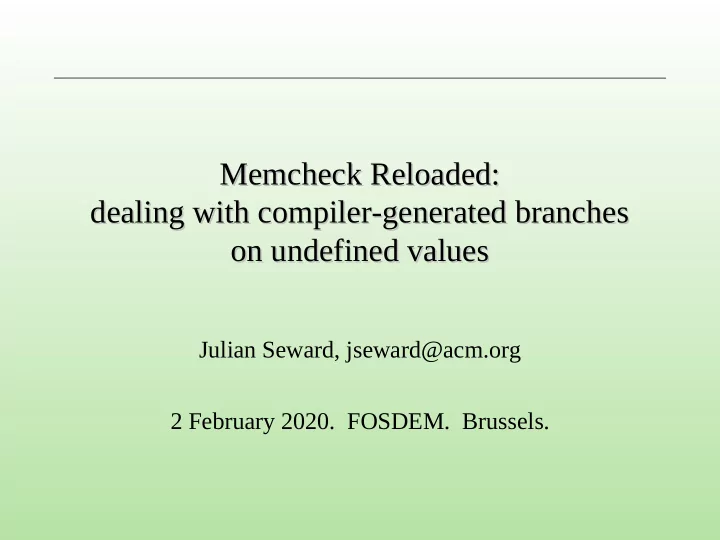

Memcheck Reloaded: Memcheck Reloaded: dealing with compiler-generated branches dealing with compiler-generated branches on undefined values on undefined values Julian Seward, jseward@acm.org 2 February 2020. FOSDEM. Brussels.
Motivation Memcheck checks Whether memory accceses are to allowable locations (Relatively) easy Whether branches depend on undefined values (Relatively) difficult Low false positive rates are very important Circa 2005 Everything under control Circa 2015 Increasingly problematic – clang 3+, gcc 5+ Overview Some definedness tracking examples The undefined-conditional-branch problem The solution
Some basics For every bit of process state, Memcheck maintains a shadow (“V”) bit all registers and memory locations are shadowed 1 means Undefined. 0 means Defined. When program computes a result from operands .. r = x + y .. Memcheck computes definedness of result from definedness of operands r# = ... x# ... y# ... When program does a conditional branch, Memcheck checks definedness of the condition and emits an error if undefined As described in our Usenix 2004 paper (Seward & Nethercote) http://valgrind.org/docs/memcheck2005.pdf
Tracking definedness in value flows In principle .. We know exact definedness behaviour of AND , OR , NOT NOT: 0 → 1, 1 → 0, U → U AND: (0,U) → 0, (1,U) → U, for non- U inputs as expected Any arithmetic op can be reduced to an AND/OR/NOT formula → we can derive “exact” definedness propagation for any op In practice .. Way too expensive Use cheap approximations Mostly OK – undef value use hard to reason about
Value flows #2 Eg Integer Add Simplest: all output bits are U if any input bit is U 10U0 +# 0001 → UUUU Too crude .. can’t deal with “overwidth” adds Better: we know undefjnedness propagates only leftwards 10U0 +# 0001 → UUU1 Best: defjned zeroes stop leftward propagation 10U0 +# 0001 → 10U1 Costs: circa, 3, 5, 10 insns
Value flows #3 Choose approximations from real-world experience Add/Sub: inexact (“Better”) for address computations exact (“Best”) for everything else And/Or: exact: AND with 0, OR with 1 → Defjned Integer ==: defjned 1 vs defjned 0 makes result Defjned even if all other bits undefjned Shifts tracked exactly Most other ops approximated safely – input undefjnedness pollutes entire output Things it doesn’t know, eg: Undefjned * zero → Defjned x >=unsigned 101010000 → Defjned even if lowest 4 bits of x are undefjned And this worked pretty well. Until ...
The Problem … until .. complaints on this int result bool ok = compute_something(&result) if (ok && result == 42) { … } ←------------- ERROR REPORTED! Why? ‘cos clang/gcc compiled it like this: if (result == 42 && ok) { … } Compiler’s buggy. Right? well actually A && B == B && A if A is false whenever B is undefjned Program and compiler are correct, so why is this error reported?
Why is this a problem Unit of analysis is “basic block” - Straight line code ending in branch - Memcheck assumes every conditional branch is “important” int result bool ok = compute_something(&result) if (result == 99 && ok) { … STUFF .. } .. AFTER .. ok = call compute_something result == 99 ? t f ok == true ? t f STUFF AFTER
Why is this a problem #2 Can’t “see” over multiple blocks Basic-blockness deeply wired in What to do? Complex ”If an undef value use is observed in a conditional branch, only report it if the architected machine state is changed before we arrive at the instruction which is the immediate postdominator of the branch ...” .. or something like that. Naaah Way too complex
What do to? Summer 2018 Depressed. “End of the road for Memcheck” Winter 2018 Depressed. (Cold and dark) Summer 2019 Hmm. Didn’t we already solve this problem before? Same as pure-value-flow for AND AND 0, Undefined == AND Undefined, 0 == Defined-0 Problem is, the AND is spread over multiple blocks Need to “recover”/”reconstruct” it
So here’s the plan Transform this ... into ... this A A C1 = ... C1 = ... C1 ? B if C1 C2 = ... if C1, else false t C1 & C2 ? B f C2 = ... t f C2 ? f t X Y X Y Be careful about B when C1 is false Now we can use value-level exact instrumentation for &
Implementation feasibility Don’t want to do this per-arch (ARM, x86, Power, Mips, S390) But their branch insns are all different Leverage Valgrind’s IR infrastructure Translate to IR normalise (a.k.a ”optimise”) pattern-match transform This will slow down the JIT True. But not much Backend costs dominate This is front-end Same mechanism handles source level && and ||
So, in conclusion .. Memcheck lives to ride another day \o/ \o/ \o/ Can run Firefox compiled with clang -O2, gcc -O2, with zero false positives (of this kind) Available on x86 32/64, arm 32/64, power 32/64 MIPS 32/64 and S390 crash for unknown reasons On those targets, is disabled until it can be fjxed In the tree now; seems stable Will be in Valgrind 3.16 Thank you for listening! Questions?
Recommend
More recommend